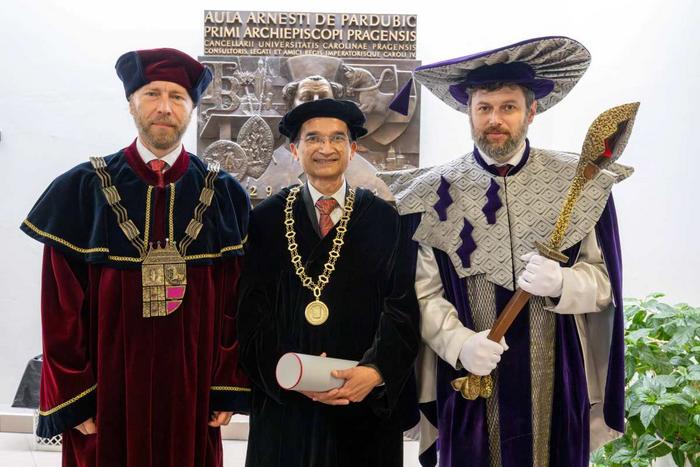Himanshu Jain, the esteemed T.L. Diamond Distinguished Chair in Engineering and Applied Science at Lehigh University, has been honored with an honorary doctorate by the University of Pardubice in the Czech Republic. This prestigious recognition, known as the doctor honoris causa, was bestowed upon him during a distinguished ceremony held on April 25, 2025, within the hallowed halls of the university’s Arnošt of Pardubice Assembly Hall. The award acknowledges Jain’s groundbreaking contributions to glass science, his visionary leadership in graduate education, and his enduring collaboration with the Faculty of Chemical Technology at Pardubice.
Professor Jain’s research portfolio spans over two and a half decades of pioneering work on chalcogenide glasses—an exotic category of amorphous materials exhibiting unique optical characteristics, such as high refractive indices, nonlinear optical responses, and infrared transparency. These properties make chalcogenide glasses highly attractive for applications in photonics, enabling advances in optical communication, infrared sensing, and nanolithography technologies. His deep investigations have not only enhanced the fundamental understanding of structural dynamics and thermophysical properties of these materials but have also paved the way for innovative functional devices.
The intersection of fundamental science and practical application defines Jain’s scholarly impact. His extensive collaboration with researchers at the University of Pardubice has focused on tailoring the physicochemical properties of chalcogenide glasses to optimize their function in advanced technological areas. This work involves manipulating glass network formers and modifiers to engineer materials with controllable band gaps, high optical nonlinearities, and enhanced environmental stability—crucial features for next-generation sensors and optoelectronic components. Jain’s leadership on international advisory boards further bolsters cross-institutional innovation, allowing for the integration of complementary expertise across continents.
Throughout his distinguished career, Himanshu Jain has been a prolific contributor to scientific literature, with over 420 peer-reviewed journal articles and authorship or editorship of 10 seminal books. His inventiveness is encapsulated in a portfolio of 12 patents, reflecting his role in translating theoretical insights into tangible technologies. Jain’s global recognition includes receiving the Otto Schott Award—the preeminent accolade in glass science worldwide—as well as the Zachariasen and N.F. Mott Awards, underscoring his status as a leading figure within the international materials science community.
His academic leadership extends beyond research publication. As the founding director of Lehigh University’s International Materials Institute for New Functionality in Glass and the Institute for Functional Materials and Devices (I-FMD), he has fostered multidisciplinary research environments that promote the convergence of chemistry, physics, and engineering. His visiting scholar appointments at institutions including the University of Cambridge, University of Aberdeen, and University of Dortmund demonstrate the broad international impact of his expertise. These roles have enabled collaborative ventures that bridge experimental and theoretical approaches across diverse cultural and scientific landscapes.
Jain’s acceptance speech at the University of Pardubice offered profound reflections on the nature of recognition in academia. He emphasized that honors such as the doctor honoris causa resonate deeply because they come from peers who appreciate the significance of scholarly contributions. Highlighting serendipitous moments throughout his career, Jain shared anecdotes in which chance interactions catalyzed transformative research endeavors—from a fortuitous meeting at Brookhaven National Laboratory that secured his initial research position to unplanned conversations on airplanes and social gatherings that sparked fruitful collaborations in bioactive glasses and clinical materials science.
His career narrative underscores the unpredictable pathways through which scientific progress often unfolds. Chance encounters with interdisciplinary colleagues and unexpected opportunities have shaped the trajectory of his work, resulting in breakthroughs that have extended beyond academia to tangible societal benefits. Jain credited the collective efforts of faculty and students at the University of Pardubice for cultivating an intellectual environment rich with dialogue, ultimately enabling many of his research breakthroughs and making the honorary ceremony a momentous occasion.
Jain’s commitment to graduate education reform is equally transformative. During his visit, he delivered a compelling lecture advocating for a reimagined doctoral training paradigm that embraces collaboration between academia and industry. He highlighted Lehigh University’s Pasteur Partners PhD (P3) program as an exemplar initiative that immerses doctoral candidates in real-world research challenges. This program, which Jain co-developed with support from the National Science Foundation, seeks to bridge the traditional gap between fundamental research and practical application by fostering cross-sectoral partnerships and equipping students with the skills necessary to tackle urgent societal problems.
The P3 program’s innovative framework blends use-inspired research with rigorous scholarship, positioning emerging scientists and engineers to drive innovation in a rapidly evolving technological landscape. Jain’s vision for graduate education aligns with broader efforts within the STEM community to cultivate versatile researchers who can seamlessly transition between academic inquiry and industry demands. His advocacy reflects an acute awareness that the future of scientific progress depends upon adaptable, collaborative, and impact-driven education models.
In sum, Himanshu Jain’s honorary doctorate from the University of Pardubice symbolizes a synthesis of outstanding scientific achievement and dedicated mentorship. His career stands as a testament to the power of interdisciplinary collaboration, innovative materials research, and visionary educational leadership. The award not only honors his personal accomplishments but also celebrates the enduring partnership between Lehigh University and the University of Pardubice, which continues to enrich the global glass science and engineering community.
As technologies reliant on advanced glass materials continue to proliferate—from telecommunications and computing to healthcare and environmental sensing—Jain’s work remains at the forefront of scientific innovation. His unique ability to connect fundamental material science with practical engineering solutions exemplifies the evolving role of researchers in the 21st century. Through his ongoing scholarship and educational initiatives, Himanshu Jain is shaping the future of both science and society.
Subject of Research: Glass science, chalcogenide glasses, materials science, and graduate education reform
Article Title: Himanshu Jain Awarded Honorary Doctorate for Groundbreaking Contributions to Glass Science and Graduate Education
News Publication Date: April 25, 2025
Web References:
- https://engineering.lehigh.edu/faculty/himanshu-jain
- https://www.upce.cz/en/university-of-pardubice-awarded-honorary-doctorates-for-contributions-to-historical-and-chemical
- https://lehighonline.hosted.panopto.com/Panopto/Pages/Viewer.aspx?id=2f0f4373-b075-4059-a060-b2eb012a60d4
- https://sites.google.com/lehigh.edu/pasteur-partners-phd-program/home
- https://www.nsf.gov/funding/initiatives/ige/updates/catalyzing-change-stem-graduate-education-power-use-inspired
- https://engineering.lehigh.edu/institute-functional-materials-and-devices
Image Credits: Courtesy of the University of Pardubice, Czech Republic
Keywords: Materials science, glass, chalcogenide glasses, engineering, graduate education, STEM, photonics, nanolithography, chemical sensing, Europe, North America




